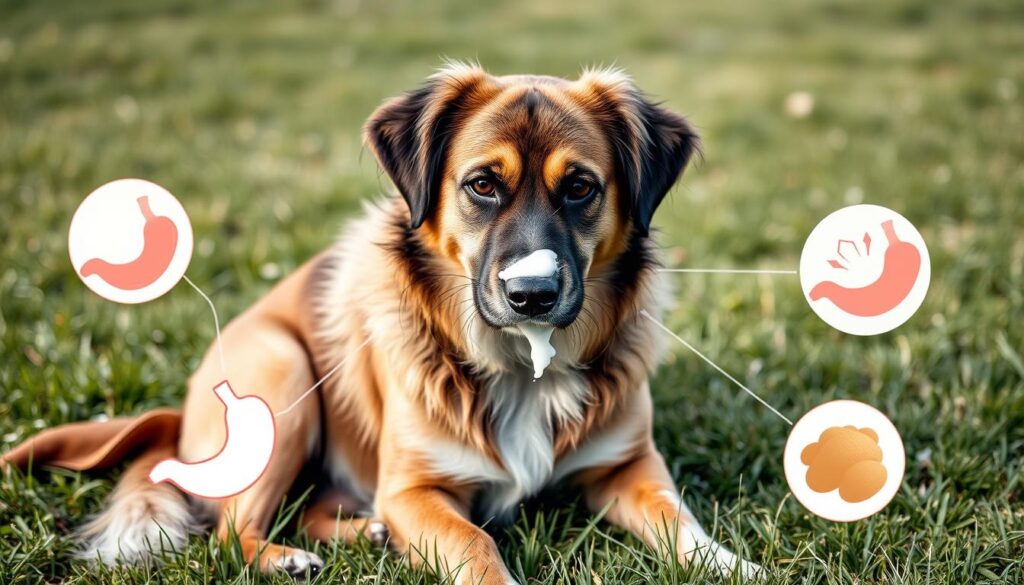If your dog is throwing up white foam, it’s a worrying sight. Vomiting is common in dogs, but white foam means there’s a problem. Knowing the causes and when to see a vet is key to helping your dog.
Key Takeaways
- White foam vomiting in dogs may signify gastrointestinal or medical issues.
- Identifying the underlying cause is crucial for proper treatment.
- Certain dietary factors and conditions can contribute to foamy vomit.
- Paying attention to emergency signs can help determine when to seek veterinary help.
- A combination of home care and medical interventions may be necessary for recovery.
Understanding White Foam Vomit in Dogs
If your furry friend is dog throw up white foam, it’s key to know what it means. Dog vomiting foam might look scary, but it’s usually a sign of something simple. It can tell you a lot about your pet’s health.
Different Types of Canine Vomit
Dogs vomit for many reasons, and the vomit looks different each time. You might see:
- Clear or yellow liquid (bile)
- Partially digested food
- Foamy, white or frothy vomit
The look of the vomit can hint at what’s wrong. White foam vomit stands out because of its unique look.
Why White Foam is Different from Regular Vomit
White foam vomit is made of saliva, stomach acid, and air. It happens when the dog’s stomach tries to get rid of irritants or too much air. Unlike regular vomit, dog throw up white foam doesn’t have solid food in it.
When to Be Concerned About Foamy Vomit
While dog vomiting foam isn’t always a big deal, watch for signs. If your dog keeps vomiting white foam, or if they seem tired, don’t eat, or show other bad signs, see a vet.
Common Causes of Dog Throwing Up White Foam
If your dog is vomiting white foam, it’s key to know why. This symptom can be due to minor issues or serious health problems. Let’s look at some common causes to help you understand and address the situation.
Stress and Anxiety
Dogs can get stressed or anxious, leading to vomiting. This might happen when their environment changes, they’re separated from their owners, or face other stressful situations.
Gastritis and Stomach Irritation
Gastritis, or inflammation of the stomach lining, can cause white foam vomiting. This can happen if your dog eats something they shouldn’t, like a toxic substance or too much spicy food.
Acid Reflux and Esophageal Issues
Acid reflux can also cause white foam vomiting in dogs. It happens when stomach acid flows back into the esophagus. This can be due to certain medications, diet, or health problems.
Pancreatitis
Pancreatitis, or inflammation of the pancreas, can also lead to vomiting. It’s often caused by a high-fat diet or other health issues.
If your dog keeps vomiting white foam, it’s crucial to see a vet. They can find the cause and treat it. Early action can prevent more problems and keep your dog healthy.
Gastrointestinal Issues Leading to Foamy Vomit
When your dog vomits white foam, it might mean they have a stomach problem. Many digestive issues can cause this symptom. Knowing the cause can help you care for your dog better.
Acid Reflux and Stomach Problems
White foam vomiting often comes from acid reflux in dogs. This happens when stomach acid goes back up into the esophagus. It can also lead to stomach ulcers or chronic inflammation.
Digestive System Inflammation
Inflammation in the digestive system, like gastritis or enteritis, can cause white foam vomit. It might be due to infections, food allergies, or health issues like pancreatitis.
Food Sensitivities and Allergies
Food sensitivities or allergies can also cause foamy vomit in dogs. These can be from proteins, grains, or other diet ingredients. It leads to digestive problems and vomiting.
| Condition | Symptoms | Potential Causes |
|---|---|---|
| Acid Reflux (GERD) | White foam vomiting, heartburn, difficulty swallowing | Weakened esophageal sphincter, hiatal hernia, obesity |
| Digestive Inflammation | White foam vomiting, diarrhea, abdominal pain | Bacterial/viral infections, pancreatitis, inflammatory bowel disease |
| Food Sensitivities | White foam vomiting, diarrhea, skin irritation | Protein, grain, or other dietary allergens |
If your dog keeps vomiting white foam, see a vet. They can find the cause and help your dog feel better. Treating the problem can make your dog healthier and happier.
Medical Conditions That Cause White Foam Vomiting
When your dog throws up white foam, it might mean they have a health issue. Knowing what could be wrong is key to helping them. Let’s look at common and rare health problems that can cause this symptom.
Gastrointestinal Issues
Gastrointestinal (GI) problems are a common reason for white foam vomiting in dogs. Issues like acid reflux, gastritis, and inflammatory bowel disease can cause it. The foam comes from too much digestive fluid and mucus in the stomach.
Pancreatitis
Pancreatitis, or inflammation of the pancreas, can also lead to white foam vomiting. Dogs with this condition often feel pain in their belly, are tired, and don’t want to eat.
Liver or Kidney Disease
Liver or kidney disease can sometimes cause white foam vomiting. These diseases can upset the balance of fluids and electrolytes, leading to foamy vomit.
Neurological Disorders
Some neurological disorders, like seizures or brain tumors, can also cause white foam vomiting. These issues can affect how a dog controls their vomiting.
If your dog keeps vomiting white foam, you should take them to the vet. They can find out what’s wrong and help your dog get better. Early treatment is important for your dog’s health and to avoid more problems.

Dietary Factors and White Foam Vomiting
When your furry friend starts vomiting white foam, check their diet. The quality and timing of their meals can affect their health. This can lead to vomiting.
Impact of Feeding Schedule
Irregular or infrequent meals can upset your dog’s digestion. This can cause more acid and white foam vomit. A regular meal schedule and portion sizes can help.
Role of Food Quality
The quality of your dog’s food matters. Low-quality or hard-to-digest foods can irritate their stomach. Choosing high-quality, easy-to-digest food can help.
Importance of Proper Hydration
Keeping your dog hydrated is key for a healthy stomach. Dehydration can lead to less saliva, which helps with digestion. Make sure your dog always has clean water.
By focusing on diet, including meal times, food quality, and hydration, you can help your dog. This can reduce white foam vomiting.
| Dietary Factor | Impact on White Foam Vomiting | Recommended Approach |
|---|---|---|
| Feeding Schedule | Irregular or infrequent feeding can disrupt digestion, leading to excess acid production and white foam vomit. | Establish a consistent mealtime routine and appropriate portion sizes. |
| Food Quality | Low-quality ingredients or foods that are difficult to digest can cause digestive tract irritation and inflammation, contributing to white foam vomiting. | Choose high-quality, easily digestible dog food. |
| Hydration | Dehydration can decrease saliva production, leading to an imbalance in stomach acid and the formation of white foam vomit. | Ensure your dog has access to clean, fresh water throughout the day. |
Emergency Signs to Watch For
If your dog is vomiting white foam, watch for other symptoms that could mean a serious problem. Dog vomiting emergency situations need quick vet care to keep your pet safe. Here are the key signs that mean you should act fast.
One big worry is if your dog keeps vomiting white foam without stopping. This could mean a blockage or a serious health issue. Don’t wait to see if it will resolve on its own; seek veterinary help right away.
- Lethargy and lack of energy
- Dehydration, indicated by dry gums or sunken eyes
- Fever or elevated body temperature
- Abdominal pain or discomfort, evidenced by whining or restlessness
- Reduced or complete loss of appetite
These symptoms, with dog vomiting white foam, might show a serious health issue. This could be pancreatitis, intestinal blockage, or even bloat. If you see any of these emergency signs, get vet help fast.
| Symptom | Potential Cause | Urgency |
|---|---|---|
| Persistent vomiting | Gastrointestinal blockage | High |
| Lethargy and dehydration | Digestive system issues | High |
| Abdominal pain | Pancreatitis or other inflammatory conditions | High |
| Loss of appetite | Underlying medical condition | Moderate |
When it comes to dog vomiting emergency, it’s safer to be cautious. If you’re worried about your dog’s vomiting, call your vet right away. They can guide you and help your dog.

Treatment Options for Dogs Vomiting White Foam
If your dog is vomiting white foam, there are ways to help. You can try home remedies or see a vet. Knowing what to do can really help your dog feel better.
Home Remedies and Care
For mild cases, you can try a few things at home. These include:
- Feeding small, easy-to-digest meals like boiled chicken and rice
- Keeping your dog hydrated with fresh water
- Letting them rest and avoiding too much activity
- Comforting them with gentle pets to reduce stress
Veterinary Interventions
If your dog’s vomiting doesn’t stop or gets worse, see a vet. They can check your dog, run tests, and suggest treatments like:
- Medicines to stop the vomiting
- Antacids or other stomach treatments
- Changes in diet or supplements for food allergies
- Medicines for any underlying health issues
Recovery Timeline
How long it takes for your dog to get better depends on the cause and treatment. Usually, with the right care, vomiting stops in a few days to a week. But, if it doesn’t get better or gets worse, you need to see your vet again.
Understanding treatment options and acting quickly can help your dog feel better. Always talk to your vet for the best advice and support.
Prevention Strategies and Lifestyle Changes
To stop your dog from vomiting white foam, keep their health and digestion in check. Look at their diet and make sure it’s balanced and high-quality. This should match their age, breed, and how active they are. Also, make sure they always have clean, fresh water to drink.
Exercise is key to keeping your dog’s stomach happy. Take them for walks, play with them, and use fun toys. Be careful with new foods or treats. Introduce them slowly to avoid upsetting their stomach.
Regular vet visits are important to watch your dog’s health. Your vet can help with preventive care. This includes shots, deworming, and dental care. These steps can help keep your dog’s digestive system healthy and prevent vomiting.

